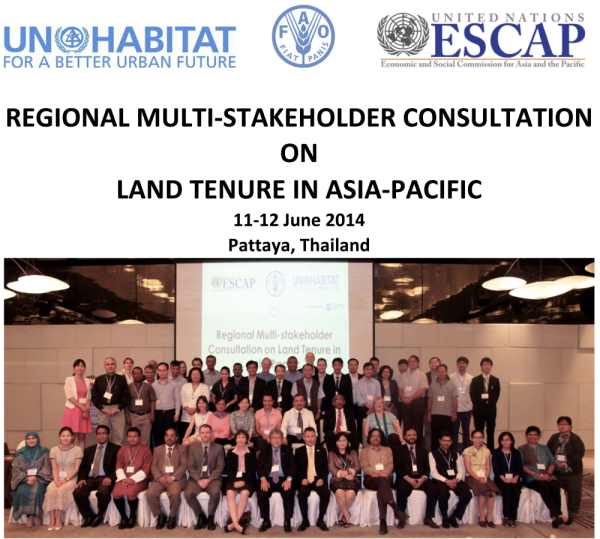News in 2014

|
Regional Multi-Stakeholder Consultation on Land Tenure in
Asia-Pacific
11-12 June 2014, Pattaya, Thailand

Photograph from of UNESCAP/FAO/UN-Habitat
UNESCAP, FAO and UN-Habitat co-organised a Regional Multi-stakeholder
Consultation on Land Tenure in Asia-Pacific at Pattaya, Thailand on 11 – 12
June 2014. The event was supported by FIG and was attended by about 60
participants that included those from 18 countries in Asia-Pacific.
Participants also came from civil society organizations, a total of 14 as
well as from governments and international organisations. At the two-day
event, participants discussed on land policy, land governance, land-based
regulatory framework and associated initiatives, identified gaps and key
issues for follow up actions.
There were presentations from FAO on the application of the Voluntary
Guidelines and the Responsible Agricultural Investment (RAI), from GLTN on
the Continuum of Land Rights, pro-poor land tools and approaches and from
UNESCAP on the significance of land for progress in social, economic and
climate change related initiatives in the Asia-Pacific region. The
participants recognised the importance of sharing knowledge, regional
cooperation and platforms.
Leading up to the consultation, a scoping study on land tenure issues,
challenges and opportunities in the Asia-Pacific was commissioned. The
result of the study was presented at the consultation and key issues
identified included –
- growing rural populations and access to land;
- urban growth and tenure insecurity;
- women’s tenure security and access to land and resources;
- tenure insecurity of indigenous peoples;
- impact of climate change and natural disasters on tenure security;
- Islamic land tenure and security; and
- land administration, land-based financing, land policy and
legislation.
Challenges identified included -
- capacity limitations in government agencies;
- disconnect between development, climate change, land use planning
and the land sector;
- lack of understanding of the private sector’s role; and
- large number of people outside formal land administration systems.
The result of this scoping study was presented in the Session: Gaps,
Challenges and Opportunities, the session and subsequent group discussion
was facilitated by FIG represented by President CheeHai Teo. Participants
were divided into four groups looking into gender and tenure security (Group
1); climate change and tenure security (Group 2); rural land, indigenous
people and tenure security (Group 3) and urbanization and tenure security
(Group 4).
The two-day event identified some opportunities including –
- leveraging on existing networks in Asia-Pacific;
- focussing on issues on gender and indigenous people;
- deploying the World Bank’s Land Governance Assessment Framework
throughout Asia-Pacific; and
- improving land administration system including incorporating Islamic
principles in Islamic jurisdictions
CheeHai Teo
June 2014
18 November 2014
|
























